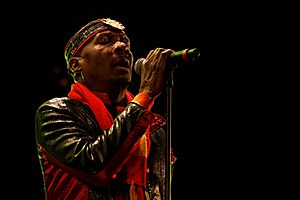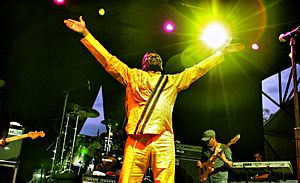Jimmy Cliff facts for kids
Quick facts for kids
Jimmy Cliff
OM
|
|
|---|---|

Cliff performing in 2012
|
|
| Background information | |
| Birth name | James Chambers |
| Born | 30 July 1944 St. James, Colony of Jamaica |
| Died | 24 November 2025 (aged 81) Kingston, Jamaica |
| Genres | Ska, rocksteady, reggae, soul |
| Occupation(s) | Musician, singer, actor |
| Instruments | |
| Years active | 1962–2025 |
| Labels | |
James Chambers, OM (30 July 1944 – 24 November 2025), known professionally as Jimmy Cliff, was a famous Jamaican musician, singer, and actor. He was a master of different music styles like ska, rocksteady, reggae, and soul. Jimmy Cliff was highly honored in Jamaica. He received the Order of Merit, which is the highest award the Jamaican government gives for achievements in arts and sciences.
Many people knew Jimmy Cliff for his popular songs. These included "Many Rivers to Cross", "You Can Get It If You Really Want", and "Reggae Night". He also made famous cover songs like "Wild World" by Cat Stevens and "I Can See Clearly Now" by Johnny Nash. This last song was featured in the movie Cool Runnings. Jimmy Cliff also starred in the film The Harder They Come. This movie helped make reggae music popular all over the world. In 2010, he was recognized for his amazing career. He was inducted into the Rock and Roll Hall of Fame.
Contents
Early Life and Musical Beginnings
Jimmy Cliff was born James Chambers on July 30, 1944. His birthplace was Saint James, in what was then the Colony of Jamaica. He started writing songs when he was still in primary school. He would listen to music from a neighbor's sound system. When James was 14, he moved to Kingston. There, he began using his stage name, Jimmy Cliff.
Rising to Stardom in the 1960s and 70s
While still a student, Jimmy Cliff tried to get his songs recorded. He also entered many talent contests. One day, he convinced a record store owner, Leslie Kong, to start a recording business with him. After a couple of songs that didn't become hits, his career took off. His song "Hurricane Hattie" became very popular when he was 17. Leslie Kong produced this hit, and they worked together until Kong's death in 1971.
Other early hits for Cliff in Jamaica included "King of Kings" and "Miss Jamaica". In 1964, he represented Jamaica at the World's Fair in New York. He also appeared in a TV show called "This is Ska!".
He later signed with Island Records and moved to the United Kingdom. His first international album, Hard Road to Travel, came out in 1967. It received great reviews. The song "Waterfall" from this album became a hit in Brazil. In 1969, he released "Wonderful World, Beautiful People". The song "Vietnam" followed in 1970. Both were popular worldwide. Even Bob Dylan called "Vietnam" the best protest song he had ever heard.
The Harder They Come Film and Soundtrack
In 1972, Jimmy Cliff played the main character, Ivanhoe "Ivan" Martin, in the famous reggae film The Harder They Come. The movie was directed by Perry Henzell. It tells the story of a young man who comes to Kingston hoping to become a music star. When that doesn't work out, he gets involved in a life of crime.
The soundtrack album for the film was a huge success. It sold many copies around the world. This helped introduce reggae music to a global audience for the first time. The film was a very important movie to come out of Jamaica.
After releasing several albums, Cliff took a break. He traveled to Africa. He later explored different spiritual paths.
Global Success in the 1980s and 90s
Jimmy Cliff soon returned to music. He toured for several years. He also recorded with famous groups like Kool & the Gang. In 1984, he performed at the Pinkpop Festival in the Netherlands. Bruce Springsteen and his band started playing Cliff's song "Trapped" during their concerts. This song became very well-known when it was included on the 1985 charity album We Are the World.
His album Cliff Hanger (1985) won a Grammy Award for Best Reggae Album. In 1985, Cliff also sang on "Sun City". This was a protest song against the unfair policy of apartheid in South Africa.
Cliff also provided backing vocals for The Rolling Stones' album Dirty Work in 1986. He appeared in the comedy film Club Paradise with Robin Williams. He contributed several songs to the movie's soundtrack. One of these was "Seven Day Weekend," which he sang with Elvis Costello. His song "Shelter of Your Love" was featured in the 1988 film Cocktail.
In 1990, Cliff appeared in the film Marked for Death. He performed "John Crow" with his band. His recording of "You Can Get It If You Really Want" was used as a campaign song in Nicaragua in 1990. In 1991, he performed at the second Rock in Rio festival in Brazil. He continued to be popular in Jamaica and the UK. He returned to the mainstream music charts in the U.S. and other countries in 1993. This was with his version of Johnny Nash's "I Can See Clearly Now". This song was on the soundtrack for the film Cool Runnings. In 1995, Cliff released the song "Hakuna Matata". This was a collaboration with Lebo M for The Lion King film soundtrack.
Later Career and Achievements (2000-2025)
In 2001, Jimmy Cliff became a judge for the Independent Music Awards. This helped support new artists. In 2002, he released the album Fantastic Plastic People in Europe. This album included songs with Joe Strummer, Annie Lennox, and Sting. In 2004, he released Black Magic, which featured a more electronic sound.
Cliff performed at the closing ceremony of the 2002 Commonwealth Games. In 2003, his song "You Can Get It If You Really Want" was in the film Something's Gotta Give. The Jamaican government honored Cliff on October 20, 2003. He received The Order of Merit. This was for his important contributions to Jamaican film and music.
In 2007, Cliff performed at the opening ceremony of the 2007 Cricket World Cup. In the same year, a political party in Britain used his song "You Can Get It If You Really Want" at their conference. Cliff said he didn't support any particular politician, but believed in what was right or wrong.
In September 2009, he was nominated for the Rock and Roll Hall of Fame. He was officially inducted on March 15, 2010, by Wyclef Jean.
Cliff appeared in the 2011 documentary Reggae Got Soul: The Story of Toots and the Maytals. This film told the story of another influential Jamaican artist.
In 2011, Cliff worked with producer Tim Armstrong on the EP The Sacred Fire and the album Rebirth. Rebirth won a Grammy Award for Best Reggae Album. Rolling Stone magazine listed it as one of the top albums of 2012. They praised his soulful voice and the mix of ska, rocksteady, and reggae. In December 2012, he was named Artist of the Year by the Caribbean Journal.
In August 2022, Cliff released his album Refugees.
Jimmy Cliff's Personal Journey
Jimmy Cliff explored different spiritual paths during his life. He was briefly part of the Rastafari movement. Later, he explored Islam. In a 2013 interview, he shared that he had a "universal outlook on life." He explained that he didn't follow any single movement or religion. He said, "now I believe in science." Jimmy Cliff was married and had two children, a daughter named Lilty Cliff and a son named Aken Cliff. He was also the father of actress and singer Nabiyah Be.
On the morning of November 24, 2025, Jimmy Cliff's wife announced his passing. He died from a seizure followed by pneumonia. He was 81 years old.
Images for kids
-
Jimmy Cliff performing in Bildein, Austria, 2012
See also
 In Spanish: Jimmy Cliff para niños
In Spanish: Jimmy Cliff para niños
- Caribbean music in the United Kingdom
- List of Jamaicans
- List of reggae musicians
- List of singer-songwriters
 | Percy Lavon Julian |
 | Katherine Johnson |
 | George Washington Carver |
 | Annie Easley |



